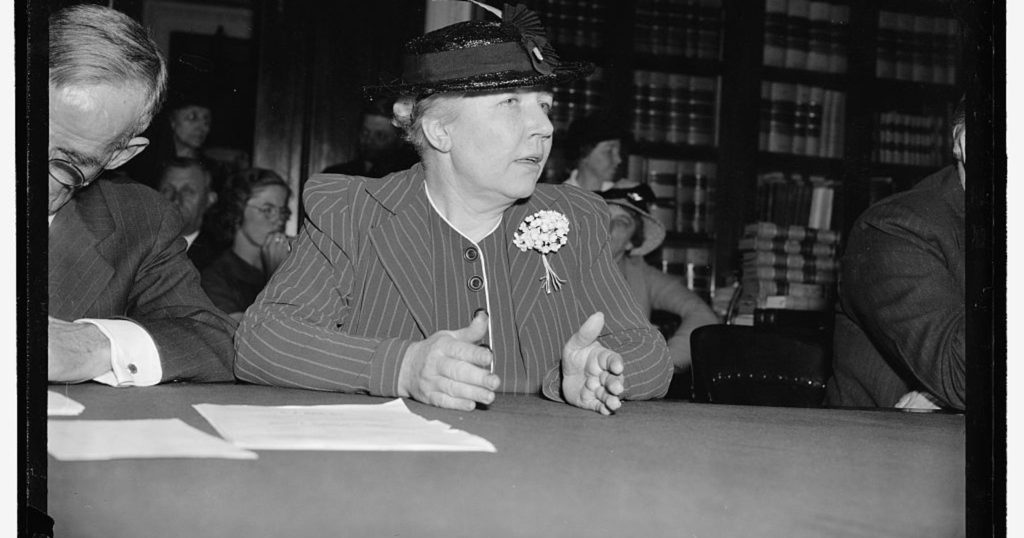American author Rose Wilder Lane passed away 50 years ago today on October 30, 1968. She rose to prominence beginning in the 1920s as a freelance journalist, becoming one of the highest paid female writers of her era.
Most readers today will likely know the works to which she contributed behind the scenes. Rose Wilder Lane was the daughter of famed pioneer Laura Ingalls Wilder, and heavily assisted her mother with editing her Little House on the Prairie books. Some researchers have even gone as far as to identify the daughter as the “ghost writer” of the nine-book series.
Under her own name, Rose Wilder Lane made her most significant contribution to the realm of political theory. She was initially drawn to communism in the early 20th century, but she quickly became much more conservative in the ensuing years. Indeed, her forays into political thought established her as one of the so-called “founding mothers” of the libertarian movement, along with Ayn Rand and Isabel Patterson.
 Her most famous work, The Discovery of Freedom, was published 75 years ago in 1943 amid World War II. The 262-page book has been recalled as the founding document of modern libertarianism. (The complete book is available for free download thanks to the Mises Institute.)
Her most famous work, The Discovery of Freedom, was published 75 years ago in 1943 amid World War II. The 262-page book has been recalled as the founding document of modern libertarianism. (The complete book is available for free download thanks to the Mises Institute.)
In contrast to fellow libertarian and atheist Ayn Rand, Rose Wilder Lane described herself as a strong “theist,” albeit not strictly a Christian. Her arguments presented in The Discovery of Freedom reflect this worldview.
In The Discovery of Freedom, Rose Wilder Lane traced ideas of freedom over the course of the previous 6,000 years of world history. She identified the headwaters of freedom in Judeo-Christian thought.
Human history began with paganism as the widespread belief system, according to Rose Wilder Lane. She wrote this worldview allowed for minimal human autonomy, instead attributing human action to preordained choices by invented gods. She added that the understanding of human independence “begins with one man,” namely Abraham:
God is The Right, he [Abraham] said; Rightness creates the universe and judges men’s acts… But God does not control any man, Abraham said; a man controls himself, he is free to do good or evil in the sight of God.
Rose Wilder Lane then embarked on a ranging summary of post-Abrahamic history, examining Jewish and Islamic thinkers who asserted the idea of human freedom from arbitrary authority. She included in this the teaching of Jesus Christ: “Again and again, in sermons and parables and acts. Christ said that all men are free.”
These ideas, of course, did not immediately transform all human political structures. Rose Wilder Lane notes that many did not know or comprehend these teachings for most of human history. However, throughout the centuries, a strain of faithful believers who did understand preserved and defended these ideas throughout the various systems of political authority that followed.
While only a select few religious figures and their followers understood the concept of human freedom, Rose Wilder Lane pointed to the American Revolution as an important point in history when these ideas gained extensive acceptance. Indeed, she contested that it was necessary to have a broad base of enlightened American citizens who understood freedom to gain individual autonomy.
“Hundreds of thousands of men and women who lived and died unknown to anyone but their neighbors, and now are completely forgotten,” participated in one of the seminal attempts to make freedom a widespread phenomenon.
Where did most American gain this understanding and passion for freedom? While some American intellectuals were reading philosophers such as “Voltaire, Rousseau, Montesquieu, [and] Chateaubriand,” these thinkers were writing “far above the heads of most Americans.” Instead, the Bible – which people of faith seeking refuge could freely read in their new homeland – provided the vast majority of Americans with insight:
In Genesis they read the nebular hypothesis of creation, and the evolutionary theory of life’s development on earth. They read about adventures and crimes, hairsbreadth escapes, and wars and spies and business deals, and political intrigues, and stories of young lovers and of family life. They pondered the salty wisdom and the unsparing analysis of human motives and human nature. And when they read the words of Abraham and Moses and Gideon and Samuel and Christ, saying that every individual is self-controlling and responsible, these words checked with the fact they knew from experience.
In the context of World War II, this reminder about the origins of American freedom by Rose Wilder Lane was no doubt needed. Communist and fascist leaders destroyed millions of lives to promote the vaguely-defined interests of the nation-state apart from its people.
“Communists, Fascists and Nazis say this in a cliché, ‘The individual is nothing,’” Rose Wilder Lane noted.
In reality, of course, it makes no sense to advocate for national interests while disregarding the interests of the people themselves who make up the country.
Today the wisdom of Rose Wilder Lane bears remembering. Although the contemporary world is not enveloped in a global war as in 1943, questioning classical liberal ideals is vogue. Political polarization and ideological conflict have become a cause for concern in America.
How to counter these trends? Any effective effort to safeguard individual freedom in America must consciously strive to rediscover the roots of freedom in the Judeo-Christian tradition from whence it came. Let us seek to do so.
No comments yet




